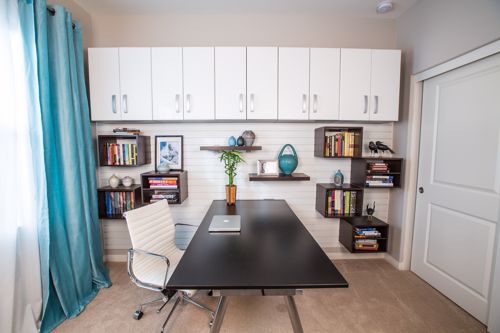
There’s little doubt 2020 has ushered in some major shifts throughout the world. The rise in working from home (WFH) has been one such big change that has impacted countless people. With thousands of people now working from the comfort of their own home, lots of homeowners are looking for ways to create a good working environment.
In many instances, people are redesigning their homes to make space for desks, larger IT networks and more ergonomic or conducive work ecosystems. Those with more resources have gone so far as to remodel their houses to incorporate more efficient workspaces. In some cases, developers and builders are also now designing new homes with remote work in mind.
But the question for many homeowners is: Does this trend make homes more valuable or attractive to buyers?
The answer, it turns out, is yes.
A realtor.com® survey from Sept. 2020, found that houses listed with a home office average a 3.4% higher price premium and sit on the market for nine days less than those listings lacking one. Further, 63% of respondents said they plan on buying a new home that can accommodate a WFH option.
Will the WFH trend last?
One factor to keep in mind involves how long the work-from-home trend will last. If next year the vast majority of employees went back to work in an office, the appeal might not be the same.
However, the rise in the remote workforce was already on the rise before the pandemic shifted an even larger percentage of employees into a work-from-home situation.
Stanford Institute for Economic Policy Research reported that 42% of the U.S. labor force now works full-time from home, with only 26% of employees working on-premise at a business, mostly essential service workers.
This isn’t a recent trend either. The remote work in the U.S. has risen by 173% between 2005 and 2018. The realtor.com® survey found that 52% of respondents prefer working remotely, with this preference holding across demographic characteristics.
With many business owners noticing a productivity increase amongst workers, and a decrease in travel costs, the trend seems like it might remain a popular option even in a post-pandemic working-from-home economy.
Should you add a home office?
Although the signs point to a slight increase in home value and a larger number of homebuyers seeking out properties with home offices, it might be too soon to say where the higher value will offset remodeling and construction costs. For now, already having the extra space for a home office is boosting properties’ marketability, but building an entire addition onto a home might not fully recoup the extra costs. Market analysts still need more data to make this determination.
However, a home office can still be a great option for homeowners who plan to continue working from home even once the economy opens back up. This can be especially helpful for remote workers who need more privacy and calm within a chaotic household.
Whether you’re a first-time homebuyer looking for a house with dedicated workspaces, or you’re a current homebuyer seeking to build an office, The Federal Savings Bank can help.
This information is intended for educational purposes only. Products and interest rates subject to change without notice. Loan products are subject to credit approval and include terms and conditions, fees and other costs. Terms and conditions may apply. Property insurance is required on all loans secured by property. VA loan products are subject to VA eligibility requirements. Adjustable Rate Mortgage (ARM) interest rates and monthly payment are subject to adjustment. Upon submission of a full application, a mortgage banker will review and provide you with the terms, conditions, disclosures, and additional details on the interest rates that apply to your individual situation.


